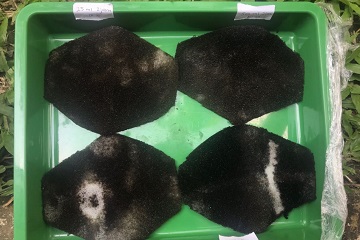IPB Students create Anti-Pollution Mask from Coconut Shell Waste

Facial and appearance problems are the main concern of women. Exposure to air pollutants makes the face texture look dull. Three students of Bogor Agricultural University (IPB) tried to solve this problem by creating "Mantan: Anti-Pollutant Mask based on Activated Nanocarbon from Coconut Shell Waste (Cocos nuciferus)".
Avia Sefrianti Hidayat, Anisa Tsalsabila and Dwi Riah Sari through Student Creativity Program in Research (PKM-PE) under the guidance of Dr. Akhiruddin Maddu used coconut shell to make "Mantan".
The abundant amount of coconut shell that is difficult to be deciphered by microorganisms has the potential as an active charcoal used for the absorbance of dust or similar particles.
"The mask that we use today is not able to work as a media to reduce the bad impact of air. Small particles have not been able to be filtered. Thus, we try to conceive mask from coconut shell," said Avia Sefrianti Hidayat.
The superiority of Mantan compared to other masks is that it has a lot of pores and contains activated carbon which increase its ability to absorb air pollutants. In addition, this Mantan is suitable for all types of skin and will not cause irritation.
"Our mask is in the form of fabric, filled by a foam with activated carbon. It looks like an ordinary mask, but it is not dangerous because the foam contains the activated nanocarbon," said Dwi Riah Sari.
To date, Mantan has reached the stage of product creation and characterization. In the near future, further testing will be conducted on the absorption of carbon dioxide and carbon monoxide using test equipment.
"Our first target for the test is IPB students," added Avia Sefrianti Hidayat
Future expectation of this Mantan is that it can be used in bulk due to its superiority that can absorb many kinds of pollutant. In addition, there is a potential of cooperation with other parties to produce it on a large scale.
"If this mask works, we hope it can be used by wider communities and they can switch the common masks to Mantan because it is more secure than the existing ones. In the future we also hope to cooperate with cosmetic industries in producing our mask on a large scale. The mask may also be patented," said Annisa Tsalsabila. (Ath/ZSP/Zul)



